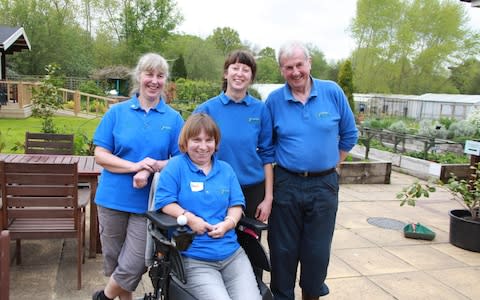Community gardeners: how to apply for an NGS award

Community gardens have become an inspiring sign of local unity in contemporary Britain, bringing people together with a common cause that is good for the environment and good for the health of the volunteers involved in the scheme.
In towns and cities, community gardens provide precious small oases of nature: trees that attract garden birds, and plant communities that provide havens for small wildlife.
In rural areas, they provide a focus for otherwise disparate communities, thinly spread across the countryside, often with few reasons for joint activity and hampered by ever-dwindling public transport.
Wherever, they introduce people to the reassuring cycle of the seasons, from seed to bud to flower and then to winter quiet. They provide an opportunity to grow to eat, like small-scale allotment sites, with productivity an added bonus to the more general gardening satisfaction.

The National Garden Scheme has been actively supporting community gardens for a decade, with annual grants that were inspired by the much-loved Telegraph columnist Elspeth Thompson. Elspeth, who died in 2010, was a great friend of the NGS, opening her jewel-like garden in Brixton for many years. She was also a passionate supporter of community gardens, loving them for their combination of ingenuity, quirkiness and social fabric.
The Elspeth Thompson Bursary Fund was set up by the NGS in 2011, and was initially run as a partnership with the Royal Horticultural Society. This year, it became the NGS’s Community Gardens Award, in memory of Elspeth Thompson. It continues to give out annual grants – and applications for this year are open until Dec 31.
To date, 59 projects in England and Wales have benefited from grants ranging from £500 to £5,000 and, in the process, made a notable contribution to their local communities. In 2019, eight awards were given out, totalling £16,208 and ranging from £800 to £3,000. The smallest went to Kyra Women’s Project, which supports vulnerable women in York.

Veronica Brook, county organiser for the NGS in Yorkshire, describes the project: “It was exciting to see how just a few hundred pounds could make such a difference to Kyra, and it was a privilege to be involved even in such a tiny way. The garden gave a lovely vibrancy to such a small space surrounded by buildings. in that historic part of York… I could imagine what a welcome place it would be to any woman in need of Kyra’s care or help: to sit in company or alone, and in which to garden or just look and enjoy.”
The largest award of £3,000 went to the Therapy Garden in Guildford, Surrey. The charity helps students excluded from mainstream education, and other clients are referred from the local community via the medical centre, the police or social services. Horticulturalist Emma says:
“The transformative effects of the garden are great to watch. One student from a special educational needs school arrived literally hidden in his hoodie, unimpressed by the thought of gardening and unwilling to even put on his work boots or gloves. But over the space of a year something completely changed. Now he’s the first one through the gate in the mornings and the first to be in the garden enjoying his work.”
For Paul, who lives with dementia, and his wife and carer Sheila, their monthly visit to the Therapy Garden, recommended by their occupational therapist, provides a welcome break. “Chatting to people who are carers like me is lovely,” says Sheila, because “dementia can be so isolating. I feel at home here.”
The Therapy Garden is a great example of social prescribing, whereby GPs and other medical professionals steer people towards non-medical solutions such as gardening, rather than prescribing pills or a visit to hospital. Sir Sam Everington, the GP, was a pioneer of social prescribing, with the now renowned community project at his practice in the heart of multicultural Bromley-by-Bow in east London.
Thanks to im and others, the importance of social prescribing was formally recognised this year by the Department of Health and NHS England, which means that community gardens are set to play an ever-greater part in our individual and public health and wellbeing.
George Plumptre is the chief executive of the National Garden Scheme

